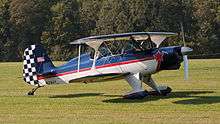Stolp Starduster Too
The Stolp Starduster Too SA300 is a two-seat, conventional landing gear equipped homebuilt biplane. Aircraft Spruce & Specialty Co currently holds rights to sell plans for the aircraft.
| Stolp Starduster Too SA 300 | |
|---|---|
| Starduster Too | |
| Role | Sport biplane |
| National origin | United States |
| Manufacturer | Stolp Starduster Corporation |
| Designer | Lou Stolp |
| Unit cost |
$15,000 kit price in 2010 |
| Developed from | Stolp Starduster |

Design and development
The Starduster Too was developed to be an economical two-seat sport biplane. The airplane is designed to plus 6 or minus 6 G loading. It was not intended for use in aerobatic competition, but it can perform basic aerobatics.[1]
The fuselage is made of 4130 steel tubing with fabric covering. The spars are made of spruce wood with plywood wooden wing ribs. The base engine is a Lycoming O-360 180 hp (134 kW) engine, but alternative examples have been built using the Lycoming IO-540, Ranger, Ford V-8 and V-6, Continental, Jacobs, and even Pratt & Whitney R-985 engines.[2]
Operational history
The Starduster Too is a popular biplane homebuilt design. There are several with over 2500 hours of flight time, and one with over 5000 hours.[1]
Variants
The Stolp Acroduster, and Stolp Acroduster Too, were the follow on models to the Starduster. They were scaled down 10 percent, and stressed to 9g. The first example was registered as a Schrack-Stolp Super Starduster Too.[3]
One example of a Starduster Too was modified with retractable gear and a sliding canopy. The aircraft named "Samsong" was able to cruise at 150 mph, and had an 830-mile range with 45 gallons of fuel using modified gear legs from a Cessna 140[4]
Specifications Starduster Too
Data from Aircraft Spruce[1]
General characteristics
- Capacity: 2
- Length: 20 ft 7 in (6.27 m)
- Wingspan: 24 ft (7.3 m)
- Height: 7 ft 3 in (2.21 m)
- Wing area: 165 sq ft (15.3 m2)
- Airfoil: M6
- Empty weight: 1,000 lb (454 kg)
- Gross weight: 1,704 lb (773 kg)
- Fuel capacity: 28 Fuse 15 Wing
- Powerplant: 1 × Lycoming O-360 , 180 hp (130 kW)
Performance
- Maximum speed: 160 kn (180 mph, 290 km/h)
- Cruise speed: 116 kn (134 mph, 216 km/h)
- Stall speed: 49 kn (56 mph, 90 km/h)
- Service ceiling: 23,000 ft (7,000 m)
- g limits: +/- 6
- Roll rate: 120°/s
- Rate of climb: 1,500 ft/min (7.6 m/s)
See also
Aircraft of comparable role, configuration and era
- Acro Sport II
- Aviat Eagle II (Christen Eagle)
- Fisher Celebrity
- Fisher FP-404
- Fisher R-80 Tiger Moth
- Marquart MA-5 Charger
References
- "Biplanes-Starduster Too". Retrieved 6 October 2010.
- "Starduster Too" (PDF). Retrieved 6 October 2010.
- Lou Stolp (August 1972). "Stolp's new Acroduster". Sport Aviation.
- Jack C. Swan (August 1969). "Samsong". Sport Aviation.
- Taylor, John W. R. Jane's All The World's Aircraft 1966–67. London:Sampson Low, Marston & Company, 1966.
- Taylor, John W. R. Jane's All The World's Aircraft 1988–89. Coulsdon, UK: Jane's Defence Data, 1988. ISBN 0-7106-0867-5.
External links
| Wikimedia Commons has media related to Stolp SA-300 Starduster Too. |